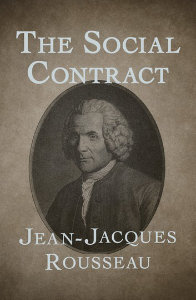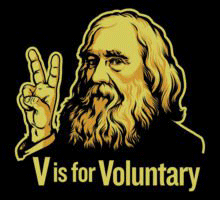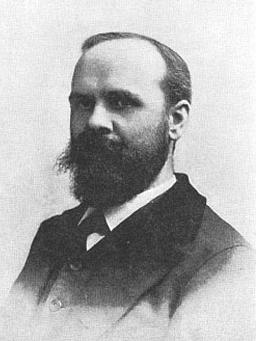
The idea that the voluntary taxationist objects to the State precisely because it does not rest on contract, and wishes to substitute contract for it, is strictly correct, and I am glad to see (for the first time, if my memory serves me) an opponent grasp it. But Mr. Read obscures his statement by his previous remark that the proposal of voluntary taxation is "the outcome of an idea ... that the State is, or ought to be, founded on contract." This would be true if the words which I have italicized should be omitted. It was the insertion of these words that furnished the writer a basis for his otherwise groundless analogy between the Anarchists and the followers of Rousseau. The latter hold that the State originated in a contract, and that the people of today, though they did not make it, are bound by it. The Anarchists, on the contrary, deny that any such contract was ever made; declare that, had one ever been made, it could not impose a shadow of obligation on those who had no hand in making it; and claim the right to contract for themselves as they please. The position that a man may make his own contracts, far from being analogous to that which makes him subject to contracts made by others, is its direct antithesis.
It is perfectly true that voluntary taxation would not necessarily "prevent the existence of five or six 'States' in England," and that "members of all these 'States' might be living in the same house." But I see no reason for Mr. Read's exclamation point after this remark. What of it? There are many more than five or six Churches in England, and it frequently happens that members of several of them live in the same house. There are many more than five or six insurance companies in England, and it is by no means uncommon for members of the same family to insure their lives and goods against accident or fire in different companies. Does any harm come of it? Why, then, should there not be a considerable number of defensive associations in England, in which people, even members of the same family, might insure their lives and goods against murderers or thieves?.

Though Mr. Read has grasped one idea of the voluntary taxationists, I fear that he sees another much less clearly, namely, the idea that defence is a service, like any other service; that it is labor both useful and desired, and therefore an economic commodity subject to the law of supply and demand; that in a free market this commodity would be furnished at the cost of production; that, competition prevailing, patronage would go to those who furnished the best article at the lowest price; that the production and sale of this commodity are now monopolized by the State; that the State, like almost all monopolists, charges exorbitant prices; that, like almost all monopolists, it supplies a worthless, or nearly worthless, article; that, just as the monopolist of a food product often furnishes poison instead of nutriment, so the State takes advantage of its monopoly of defence to furnish invasion instead of protection; that, just as the patrons of the one pay to be poisoned, so the patrons of the other pay to be enslaved; and, finally, that the State exceeds all its fellow-monopolists in the extent of its villainy because it enjoys the unique privilege of compelling all people to buy its product whether they want it or not. If, then, five or six "States" were to hang out their shingles, the people, I fancy, would be able to buy the very best kind of security at a reasonable price. And what is more, the better their services, the less they would be needed; so that the multiplication of "States" involves the abolition of the State.

All these considerations, however, are disposed of, in Mr. Read's opinion, by his final assertion that "the State is a social organism." He considers this "the explanation of the whole matter." But for the life of me I can see in it nothing but another irrelevant remark. Again I ask: What of it? Suppose the State is an organism, - what then? What is the inference? That the State is therefore permanent? But what is history but a record of the dissolution of organisms and the birth and growth of others to be dissolved in turn? Is the State exempt from this order? If so, why? What proves it? The State an organism? Yes; so is a tiger. But unless I meet him when I haven't my gun, his organism will speedily disorganize.
The State is a tiger seeking to devour the people, and they must either kill or cripple it. Their own safety depends upon it.
But Mr. Read says it can't be done. "By no possibility can the power of the State be restrained." This must be very disappointing to Mr. Donisthorpe and Jus, who are working to restrain it. If Mr. Read is right, their occupation is gone. Is he right? Unless he can demonstrate it, the voluntary taxationists and the Anarchists will continue their work, cheered by the belief that the compulsory and invasive State is doomed to die.In answer to Mr. Read's statement (which, if, with all its implications, it were true, would be a valid and final answer to the Anarchists) that "dissolving an organism is something different from dissolving a collection of atoms with no organic structure," I cannot do better than quote the following passage from an article by J. Wm. Lloyd in No. 107 of Liberty:
It appears to me that this universe is but a vast aggregate of individuals; of individuals simple and primary, and of individuals complex, secondary, tertiary, etc., formed by the aggregation of primary individuals or of individuals of a lesser degree of complexity. Some of these individuals of a high degree of complexity are true individuals, concrete, so united that the lesser organisms included cannot exist, apart from the main organism; while others are imperfect, discrete, the included organisms existing fairly well, quite as well, or better, apart than united. In the former class are included many of the higher forms of vegetable and animal life, including man, and in the latter are included many lower forms of vegetable and animal life (quack-grass, tape-worms, etc.) , and most society organisms, governments, nations, churches, armies, etc.
Taking this indisputable view of the matter, it becomes clear that Mr. Read's statement about "dissolving an organism" is untrue while the word organism remains unqualified by some adjective equivalent to Mr. Lloyd's concrete. The question, then, is whether the State is a concrete organism. The Anarchists claim that it is not. If Mr. Read thinks that it is, the onus probandi is upon him.
I judge that his error arises from a confusion of the State with society. That society is a concrete organism the Anarchists do not deny; on the contrary, they insist upon it. Consequently they have no intention or desire to abolish it. They know that its life is inseparable from the lives of individuals; that it is impossible to destroy one without destroying the other. But, though society cannot be destroyed, it can be greatly hampered and impeded in its operations, much to the disadvantage of the individuals composing it, and it meets its chief impediment in the State.
The State, unlike society, is a discrete organism. If it should be destroyed to-morrow, individuals would still continue to exist. Production, exchange, and association would go on as before, but much more freely, and all those social functions upon which the individual is dependent would operate in his behalf more usefully than ever.
The individual is not related to the State as the tiger's paw is related to the tiger. Kill the tiger, and the tiger's paw no longer performs its office; kill the State, and the individual still lives and satisfies his wants. As for society, the Anarchists would not kill it if they could, and could not if they would.
Mr. Read finds it astounding that I should "put the State on a level with churches and insurance companies." I find his astonishment amusing. Believers in compulsory religious systems were astounded when it was first proposed to put the church on a level with other associations. Now the only astonishment is - at least in the United States - that the church is allowed to stay at any other level. But the political superstition has replaced the religious superstition, and Mr. Read is under its sway.
I do not think "that five or six 'States' could exist side by side with" quite "the same convenience as an equal number of churches." In the relations with which States have to do there is more chance for friction than in the simply religious sphere. But, on the other hand, the friction resulting from a multiplicity of States would be but a mole-hill compared with the mountain of oppression and injustice which is gradually heaped up by a single compulsory State. It would not be necessary for a police officer of a voluntary "State" to know to what "State" a given individual belonged, or whether he belonged to any. Voluntary "States" could, and probably would, authorize their executives to proceed against invasion, no matter who the invader or invaded might be. Mr. Read will probably object that the "State" to which the invader belonged might regard his arrest as itself an invasion, and proceed against the "State" which arrested him. Anticipation of such conflicts would probably result exactly in those treaties between "States" which Mr. Read looks upon as so desirable, and even in the establishment of federal tribunals, as courts of last resort, by the cooperation of the various "States," on the same voluntary principle in accordance with which the "States" themselves were organized.

Voluntary taxation, far from impairing the "State's" credit, would strengthen it. In the first place, the simplification of its functions would greatly reduce, and perhaps entirely abolish, its need to borrow, and the power to borrow is generally inversely proportional to the steadiness of the need. It is usually the inveterate borrower who lacks credit. In the second place, the power of the State to repudiate, and still continue its business, is dependent upon its power of compulsory taxation. It knows that, when it can no longer borrow, it can at least tax its citizens up to the limit of revolution. In the third place, the State is trusted, not because it is over and above individuals, but because the lender presumes that it desires to maintain its credit and will therefore pay its debts. This desire for credit will be stronger in a "State" supported by voluntary taxation than in the State which enforces taxation.
All the objections brought forward by Mr. Read (except the organism argument) are mere difficulties of administrative detail, to be overcome by ingenuity, patience, discretion, and expedients. They are not logical difficulties, not difficulties of principle. They seem "enormous" to him; but so seemed the difficulties of freedom of thought two centuries ago. What does he think of the difficulties of the existing régime? Apparently he is as blind to them as is the Roman Catholic to the difficulties of a State religion. All these "enormous" difficulties which arise in the fancy of the objectors to the voluntary principle will gradually vanish under the influence of the economic changes and well-distributed prosperity which will follow the adoption of that principle. This is what Proudhon calls "the dissolution of government in the economic organism." It is too vast a subject for consideration here, but, if Mr. Read wishes to understand the Anarchistic theory of the process, let him study that most wonderful of all the wonderful books of Proudhon, the "Idée Générale de la Révolution au Dix-Neuvième Siècle."
It is true that "history shows a continuous weakening of the State in some directions, and a continuous strengthening in other directions." At least such is the tendency, broadly speaking, though this continuity is sometimes broken by periods of reaction. This tendency is simply the progress of evolution towards Anarchy. The State invades less and less, and protects more and more. It is exactly in the line of this process, and at the end of it, that the Anarchists demand the abandonment of the last citadel of invasion by the substitution of voluntary for compulsory taxation. When this step is taken, the "State" will achieve its maximum strength as a protector against aggression, and will maintain it as long as its services are needed in that capacity.
If Mr. Read, in saying that the power of the State cannot be restrained, simply meant that it cannot be legally restrained, his remark had no fitness as an answer to Anarchists and voluntary taxationists. They do not propose to legally restrain it. They propose to create a public sentiment that will make it impossible for the State to collect taxes by force or in any other way invade the individual. Regarding the State as an instrument of aggression, they do not expect to convince it that aggression is against its interests, but they do expect to convince individuals that it is against their interests to be invaded. If by this means they succeed in stripping the State of its invasive powers, they will be satisfied, and it is immaterial to them whether the means is described by the word "restraint" or by some other word. In fact, I have striven in this discussion to accommodate myself to Mr. Read's phraseology. For myself I do not think it proper to call voluntary associations States, but, enclosing the word in quotation marks, I have so used it because Mr. Read set the example.
